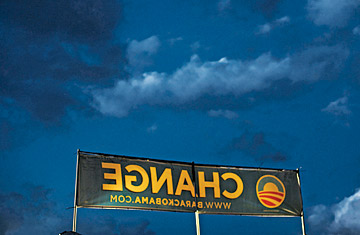
Correction Appended: April 2, 2009
Two weeks before Election Day, Barack Obama's campaign was mobilizing millions of supporters; it was a bit late to start rewriting get-out-the-vote (GOTV) scripts. "BUT, BUT, BUT," deputy field director Mike Moffo wrote to Obama's GOTV operatives nationwide, "What if I told you a world-famous team of genius scientists, psychologists and economists wrote down the best techniques for GOTV scripting?!?! Would you be interested in at least taking a look? Of course you would!!"
Moffo then passed along guidelines and a sample script from the Consortium of Behavioral Scientists, a secret advisory group of 29 of the nation's leading behaviorists. The key guideline was a simple message: "A Record Turnout Is Expected." That's because studies by psychologist Robert Cialdini and other group members had found that the most powerful motivator for hotel guests to reuse towels, national-park visitors to stay on marked trails and citizens to vote is the suggestion that everyone is doing it. "People want to do what they think others will do," says Cialdini, author of the best seller Influence. "The Obama campaign really got that." (See pictures of Obama taken by everyday Americans.)
The existence of this behavioral dream team — which also included best-selling authors Dan Ariely of MIT (Predictably Irrational) and Richard Thaler and Cass Sunstein of the University of Chicago (Nudge) as well as Nobel laureate Daniel Kahneman of Princeton — has never been publicly disclosed, even though its members gave Obama white papers on messaging, fundraising and rumor control as well as voter mobilization. All their proposals — among them the famous online fundraising lotteries that gave small donors a chance to win face time with Obama — came with footnotes to peer-reviewed academic research. "It was amazing to have these bullet points telling us what to do and the science behind it," Moffo tells TIME. "These guys really know what makes people tick."
President Obama is still relying on behavioral science. But now his Administration is using it to try to transform the country. Because when you know what makes people tick, it's a lot easier to help them change.
The Nudge Factor
We all know Obama won the election because he looked like change, sounded like change and never stopped campaigning for change. But he didn't call for just change in Washington — or even just change in America. From his declarations that "change comes from the bottom up" to his admonitions about "an era of profound irresponsibility," Obama called for change in Americans. And not just in bankers or insurers — in all of us. His Zen koan, "We are the change we've been waiting for," may sound like New Age gibberish, but it's at the core of his agenda.
In fact, Obama is betting his presidency on our ability to change our behavior. His top priorities — the economy, health care and energy — all depend on it. We need to spend more money now to avert a short-term depression, then save more money later to secure our long-term economic future. We need to consume less energy in order to reduce our oil imports and carbon emissions as well as our household expenses. We need to quit smoking, lay off the Twinkies and avoid other risky behaviors that both damage our personal health and boost the costs of care that are ravaging the nation's fiscal health. Basically, we need to make better choices — about mortgages and credit cards, insurance and retirement plans — so we won't need bailouts down the road.
The problem, as anyone with a sweet tooth, an alcoholic relative or a maxed-out Visa card knows, is that old habits die hard. Temptation is strong. We are weak. We've got plenty of gurus, talk-show hosts and celebrity spokespeople badgering us to save energy, lose weight and live within our means, but we're still addicted to oil, junk food and debt. It's fair to ask whether we're even capable of changing.
